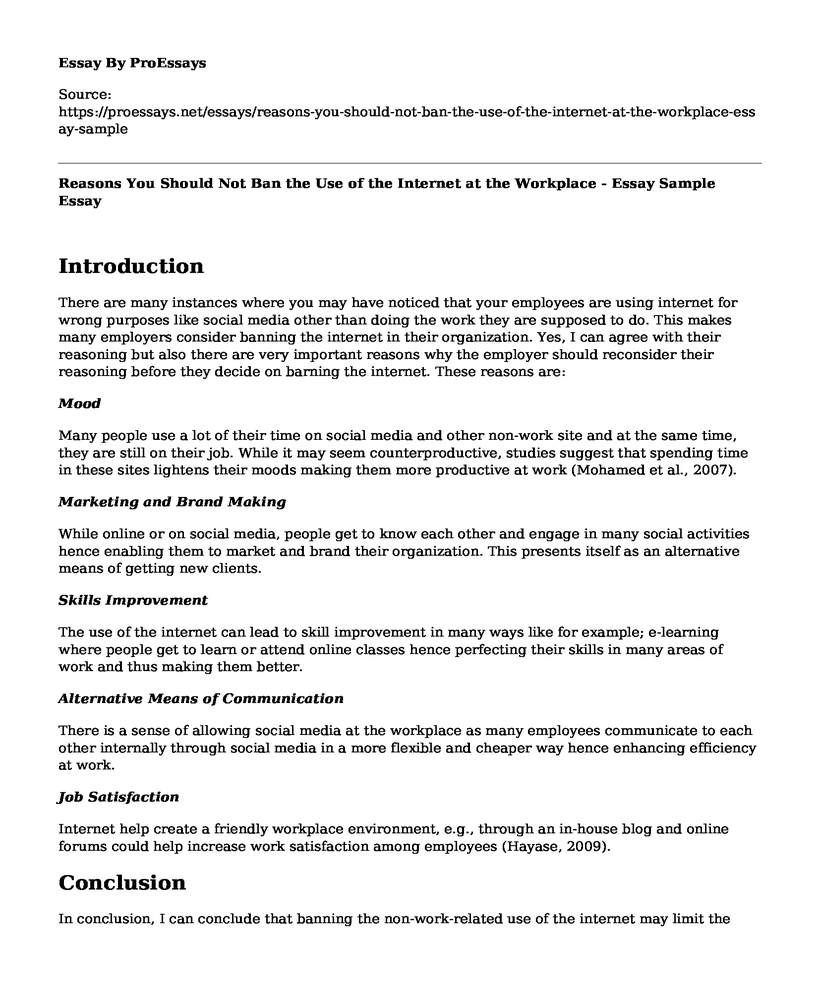Introduction
There are many instances where you may have noticed that your employees are using internet for wrong purposes like social media other than doing the work they are supposed to do. This makes many employers consider banning the internet in their organization. Yes, I can agree with their reasoning but also there are very important reasons why the employer should reconsider their reasoning before they decide on barning the internet. These reasons are:
MoodMany people use a lot of their time on social media and other non-work site and at the same time, they are still on their job. While it may seem counterproductive, studies suggest that spending time in these sites lightens their moods making them more productive at work (Mohamed et al., 2007).
Marketing and Brand MakingWhile online or on social media, people get to know each other and engage in many social activities hence enabling them to market and brand their organization. This presents itself as an alternative means of getting new clients.
Skills ImprovementThe use of the internet can lead to skill improvement in many ways like for example; e-learning where people get to learn or attend online classes hence perfecting their skills in many areas of work and thus making them better.
Alternative Means of CommunicationThere is a sense of allowing social media at the workplace as many employees communicate to each other internally through social media in a more flexible and cheaper way hence enhancing efficiency at work.
Job SatisfactionInternet help create a friendly workplace environment, e.g., through an in-house blog and online forums could help increase work satisfaction among employees (Hayase, 2009).
Conclusion
In conclusion, I can conclude that banning the non-work-related use of the internet may limit the productivity of an organization as it will increase boredom and limit employees from learning new skills. So it will be important for the employer to consider limiting the use of the internet rather than barning the internet in an organization.
References
Crossman, David. "Simon Sinek on Millennials in the Workplace." YouTube, YouTube, 29 Oct. 2016, www.youtube.com/watch?v=hER0Qp6QJNU.
Hayase, L. K. T. (2009). Internal communication in organizations and employee engagement (Doctoral dissertation, University of Nevada, Las Vegas).
Lorenz, Lynn M. "Viva La France!" Expertise + Experience MARYMOUNT'S HRM BLOG, Marymount University, 22 Feb. 2017, http://learn.marymount.edu/hrmblog/vive-la-france?utm_source=hs_email&utm_medium=email&utm_content=43155876&_hsenc=p2ANqtz-8rJWpO2wYaCxpJi5gM_88hITkbGTfXFWPxgDnUQFVVGS_tCFSDeUkiAqICtn7UChgWzE9SIYc4M-V7oiWsaRJMTFGIUg&_hsmi=43155876
Mohammed, S., Sidek, S., Izharrudin, S., Kudus, N., & Hassan, M. A. (2017). Social media impact on employee productivity at the workplace: A review. Asian Journal of Information Technology, 32-37.
Cite this page
Reasons You Should Not Ban the Use of the Internet at the Workplace - Essay Sample. (2022, May 16). Retrieved from https://proessays.net/essays/reasons-you-should-not-ban-the-use-of-the-internet-at-the-workplace-essay-sample
If you are the original author of this essay and no longer wish to have it published on the ProEssays website, please click below to request its removal:
- Education Research Paper Example on Leadership in Learning Institutions
- Profile of Sohar's Company and the HR Strategies They Use
- Leadership, Strategic Thinking and Leadership Interview Questions
- Understanding Risk Assessment Methodology Essay Example
- Essay on Global Internalization: The Path to Sustainable Business Growth
- Paper Sample on Risk Management in Banking: Protecting Assets & Avoiding Losses
- The Ideal Virtues of an Efficient Team Player - Free Essay Sample







